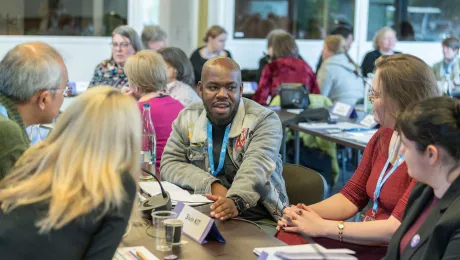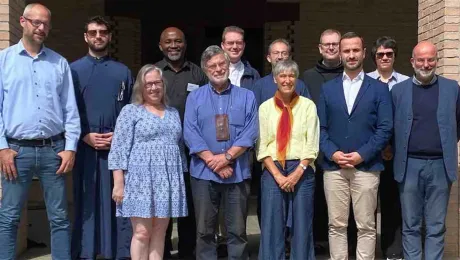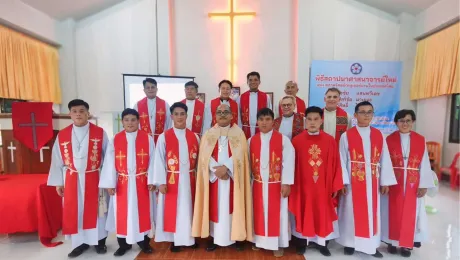
Rev. Dr. Elfriede Dörr from the Evangelical Church of the Augsburg Confession in Romania. Photo: LWF/Albin Hillert
Voices from the Communion: Rev. Dr. Elfriede Dörr
(LWI) – On World Environment Day, Rev. Dr. Elfriede Dörr from the Evangelical Church of the Augsburg Confession in Romania reflects on the effects of climate change in her country and the encouragement she draws from the young generation to bring about change. As the head of her church’s Department for Ecumenical Relations and Pastoral Training and in her personal life, she strives to connect theology, ecology, and her personal faith practice.
What are the challenges facing Romania in terms of climate change, and how aware is the society of these issues?
I find it hard to understand that the continuing desertification in our country, the decline of biodiversity, and the increasingly devastating consequences of deforestation here are not an issue in the Romanian society. It directly affects people! We can’t look away from this in the way we can from media reports on melting glaciers in the Alps or polar bears teetering on fragments of ice. I think that one reason for this general lack of awareness is the lack of environmental education in our schools.
What encourages me is that the Romanian Fridays for Future movement is calling for environmental education as a school subject. The young people proposed that to the minister for the environment. Then the Coronavirus disease (COVID-19) pandemic came, and they could not follow up with a march to the education minister.
Another cause for hope is the weak but growing protest in the civilian population about the illegal logging in virgin forests. With trees that are hundreds of years old and their rich biodiversity, these forests are very precious for our country and continent. The protests are more effective when the international public supports us on this issue. So here, as in many other cases, cross-border networking is crucial for a successful drive to care for creation.
Also, the coronavirus crisis has shown that politicians are undoubtedly able to find solutions when facing a crisis. As far as the climate crisis goes, the politicians have evaded the activists and their supporters, like me, with half-hearted measures and threadbare explanations. They have relegated a fundamental transformation of worldwide processes to the academic sphere of philosophers and economic utopians. But with the current pandemic, we have seen the world change in a matter of months! The dictates of unlimited growth demonstrated by the rich countries are massively called into question to an extent that all the activists, philosophers, and utopians put together were not able to achieve. I hope that humanity will take advantage of the opportunity of this crisis instead of going back to business as usual.
What role does the intergenerational relationship play for you when you think of climate change and climate justice?
Our current lifestyles are at the expense of coming generations. And it is becoming ever more apparent that we are also living at the expense of current generations. After all, some countries are liberally helping themselves to the earth’s resources at the cost of people in other countries. And that directly affects the populations living there today, regardless of their age. People from such countries speak up time and again in platforms provided by the Lutheran World Federation (LWF). It is essential for us to listen to them and take action. When I hear how much people are already suffering from the consequences of climate change, I feel obliged to do something.
I am impressed by the young people from Fridays for Future, who are so vocal in calling for what we older ones have long since subscribed to. That is why in many countries older people are taking to the streets together with the young ones.
In Romania, it is different. The Fridays for Future movement is very small. At the global climate protest of 29 November last year, the young people in Sibiu/Hermannstadt were fined because they had moved a bit away from the prescribed circle in front of the town hall. That sparked a wave of outrage in civil society. Representatives of the arts and culture spoke up, and public figures offered to pay the fine - with the result that all the newspapers took up the young people’s demands. And the city council was forced to invite the young people to the table and start a discussion with them.
Now COVID-19 has stalled this process. The young people, all in lockdown, have developed new methods for keeping up public awareness of the climate crisis. But I have the feeling that the online protests are confined to a kind of youth bubble unless journalists take up the issues and publish them in the classical media.
What role does the Evangelical Church of the Augsburg Confession in Romania play in this context?
We are active in various areas. We are working with our church members and congregations to equip them for a sustainable way of life. Topics on creation theology are part of the training programs for pastors. We are about to install a competence center for stewardship of creation in one of our lovely fortress churches. We speak up about urgent cases of environmentally destructive projects with high-profile statements, which have had an impact in the last few years. We are collaborating ecumenically and internationally in questions of caring for creation, e.g., through the European Christian Environmental Network (ECEN), the Lutheran World Federation, and the Evangelical Church of Westphalia.
COVID-19 has slowed down these processes, but networking is possible even when you are in lockdown. Creative ideas triggered by the corona crisis have brought about effective and thought-through changes in the way our church operates. We thank God for that.
Recently you published a booklet entitled “Geh aus, mein Herz, und suche Freud - Einfache Schritte für spirituelle Übungen zur Bewahrung der Schöpfung” (“Go forth, my heart, and seek delight” - simple steps for spiritual exercises to care for creation). Could you give us an idea of its contents and what motivated you to develop them for publication?
How does care for creation work in a very practical way? That’s what people in our church are asking. Faced with the global questions of climate justice, an individual all too quickly feels powerless. I wanted to respond to that with a ready reference, containing simple tips that each of us can put into practice. The changes I long for globally begin locally with myself.
This concern led to a guide for church members. In 10 chapters it summarizes suggestions about a number of topics: “Water”, “Food”, “Energy”, “Leisure and mobility”, “Balcony, garden, park”, “Waste“, and naturally also “Investment”, “Moral courage”, “Christmas”, and, above all, “Sunday”. These suggestions intend to help people rethink and change their lifestyles. The practical tips are linked to elementary forms of meditation. That is an expression of Christian spirituality that has tended to be sidelined in the Lutheran tradition. In this way, I am trying to promote a specific attitude: reflecting in silence before God on the challenges of our time, and drawing strength for our action from the clarity this brings us.
Perhaps the coronavirus has slowed down the reception of the guide a little. Possibly, however, it has also created space to think about what is apparent, such as discovering places to visit on your doorstep and getting to know your surroundings better. Or thinking about what is essential, such as escaping from the constraints of must-haves and consumerism - of contrasting that with the luxury of simplicity and being content with enough.
Individuals themselves need to get the feeling that they can do something. Some congregations in our church have taken this a bit further. They check through congregational activities in terms of their sustainability. They then enter their findings in a grid to earn a church environmental label - that might be “Green Church”, “Environmentally friendly parish”, or “Green fortress church”.
The Lutheran World Federation is a global body that shares the work and love of Christ in the world. In this series, we profile church leaders and staff as they discuss topical issues and set out ideas for building peace and justice in the world, ensuring the churches and communion grow in witness and strength.


